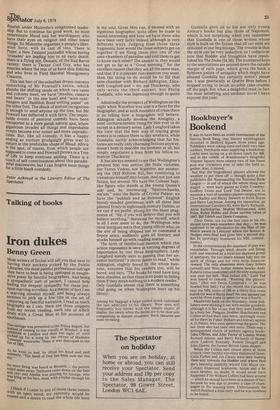Talking of books
Iron dukes
Benny Green
Most writers of fiction will tell you that next to having their pockets picked by the Public Libraries, the most painful professional outrage they have to bear is being upstaged in imaginative poesy by fanciful biographers. And being a sympathetic sort of person, I cannot help feeling the deepest sympathy for these putupon starving novelists. As a matter of fact I am a starving novelist myself, and being always anxious to pick up a few tips in the art of conjuring up fanciful narrative, I read as much biography as I can. Here are three snippets from my recent reading, each one of which deals with a Great Man at his moment of apotheosis: The carriage was presented to the Prince Regent, but instead of coming to rest royallY at Windsor, it was e)ichibited in London and then lost sight of, until Picked up for a song by the owner of Madame
ssauds waxworks. There it was destroyed in the
fire of 1925. r • As he w'ent to bed, he lifted his head and said solemnly,
day."The hand of God has been over me this
No more firing was heard at Brussels — the pursuit rolled miles away. Darkness came down on the field and city: and Amelia was praying for George, who was lying on his face, dead, with a bullet through his heart.
1 think if I came to any of those three tasters With an open mind, my curiosity would be roused and a desire to read the whole life born
in my soul. Great Men can, if blessed with an ingenious biographer, quite often be made to sound interesting and here we have three who have been very lucky indeed, although in very different ways. Judging from those three fragments, how would the three subjects get on together if we flung them into one of the ante-chambers of paradise and told them to get to know each other? The answer is, they would not get so far as a "Good morning," for the excellent reason that they are all the same man, and that if it is piquant conversation you want, then the thing to do would be to fill that ante-chamber with Richard Aldington, Elizabeth Longford and — no, not Thackeray, who only wrote the third extract, but Philip Guedalla, who was ingenious enough to quote it.
Admittedly the prospect of Wellington on the night when Waterloo was won is a facer for the biographer, and at such moments of crisis there is no telling how a biographer will behave. Aldington actually invokes the Almighty, a most uncharacteristic thing for him ever to do except in a derisory sense. Lady Longford takes the view that the best way of tracing great events is to reduce them to tiny artefacts, while Guedalla, tacitly acknowledging that his histories are really only charming fictions anyway, doesn't both to describe the moment at all, but simply negotiates a loan from his fellow-romancer Thackeray.
It has always seemed to me that Wellington's greatest feat was neither the India victories, nor Torres Vedras, nor Waterloo, nor outstaring the 1832 Reform Bill, but contriving to transmute himself into fiction. And not just one fiction, but several. We have the Colonel Santlike figure who stands at the young Queen's side and, by murmuring "Sparrowhawks, ma'am," wins the Battle of Crystal Palace; we have the "publish and be damned" English bloody-minded gentleman with all three feet planted firmly in eighteenth-century Dublin; or we can if we prefer, plump for the blunt pragmatist of, "Sir, if you will believe that you will believe anything." Speaking for myself, which is all I ever seem to do, the Wellington who most intrigues me is that young officer who, on the eve of being shipped out to command a Sepoy army, suddenly goes all literary and stocks himself up with reading matter. The birth of intellectual Dassion which this action represents is seen in varying degrees of importance by our three biographers. Lady Longford merely says in passing that her ancestor nurtured "a secret desire to read," while Aldington, slightly bored by the whole business, assumes that his readers too, will be bored, and says, "The books he read have long been obsolete, so that there is no point in listing them if they mean nothing to a modern reader." Only Guedalla senses that there is something vital going on when Wellington buys up his library:
Among his baggage a large corded trunk contained the last additions to his library. Now men will frequently buy books with the simple object of display, but rarely when the books are to be their sole companions in distant countries. Such libraries are most revealing.


































 Previous page
Previous page